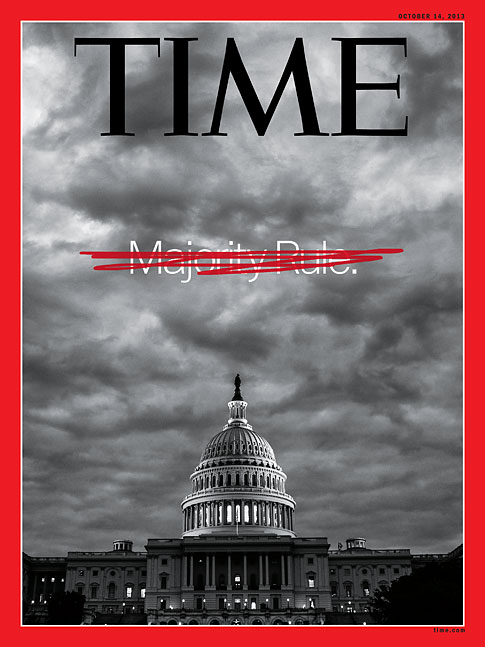
(5 of 6)
The insistent backbenchers dragged the Speaker into battle, setting in motion a fight that culminated the night of Sept. 30. By then, Boehner had settled on a strategy of forcing Democratic Senators to take a sequence of tough votes, with no real attempt to avert a shutdown. The House passed a series of budget resolutions, each one aimed at sapping Obamacare, knowing that the Senate would swiftly volley them back.
Boehner had enough votes from moderate Republicans to keep the government open, if he was willing to concede defeat and join those votes with House Democrats'. But "there would be a major revolt. He's trying to avoid that," says New York Republican Peter King, the would-be leader of the moderate insurrection. In effect, Boehner allowed the hardcores to shoot the party in the foot rather than provoking them into setting it on fire. "The question is, When does enough become enough?" King muses. "When does he decide to basically pull the nuclear trigger and start a civil war within the Republican Party?"
Doom and Gloom
The sad news is that the shutdown may be just another marker on the road from bad to worse, where the power of minority rule, refined by the politics of safe seats, paralyzes the body politic indefinitely. If the past few years have shown anything, it's that Congress can always find a way to fall further before it reaches its nadir. "No one I have talked to on either side of the aisle knows what the endgame is," explains Representative Dan Lipinski, a Democrat from Illinois. There are always more hostages to take, more ways to threaten broader harm if specific ideological goals are not embraced.
The tactic is gaining favor because it works in the narrowest sense. The 2011 standoff over the debt ceiling--which rattled markets, shaved economic growth and directly cost taxpayers billions in higher interest costs--birthed the so-called sequester, a 5% forced reduction in most discretionary spending. In January, Obama made it clear that he was willing to let all middle-class tax rates rise if Republicans did not agree to a targeted tax increase on the wealthiest Americans. More recently, Senate majority leader Harry Reid threatened to blow up Senate rules if Republicans did not allow the confirmation of a gaggle of presidential appointees. The Republicans blinked.
Even the rosiest proposed scenario for a solution to the current impasse would fund the government only through mid-November, setting the stage for another Götterdämmerung, with the prospect of yet another crisis when the government will face shutdown or the debt ceiling must inevitably be raised again. In the absence of a functional appropriations process--let alone a framework for compromise over long-term fiscal reforms--funding the government a few weeks or months at a time may become "the new normal," warns Republican Senator Jeff Flake of Arizona.
